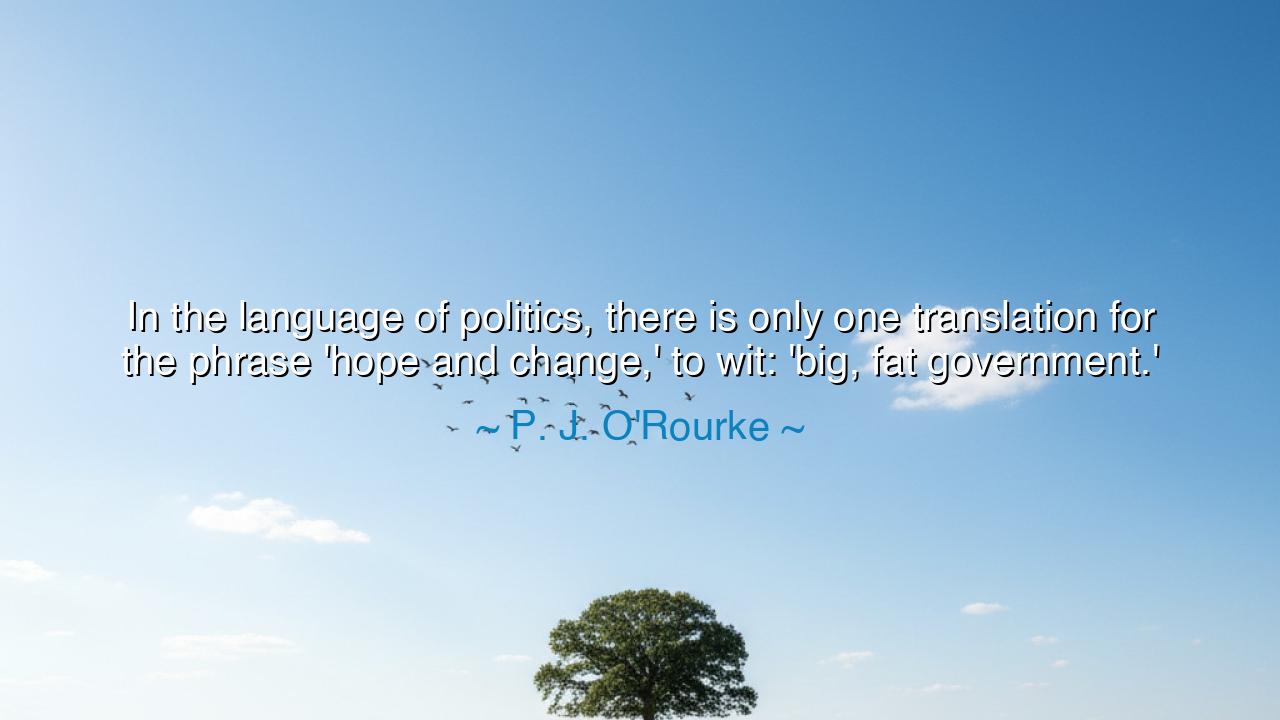
In the language of politics, there is only one translation for
In the language of politics, there is only one translation for the phrase 'hope and change,' to wit: 'big, fat government.'






"In the language of politics, there is only one translation for the phrase 'hope and change,' to wit: 'big, fat government.'" — P. J. O’Rourke
In this sharp and ironic proclamation, P. J. O’Rourke, the satirist and philosopher of modern liberty, pierces through the veil of political rhetoric to reveal a truth both uncomfortable and enduring. His words are laced with humor, yet behind the laughter lies the steel of wisdom. When he says that “hope and change” translate to “big, fat government,” he warns that the lofty promises of politicians often disguise an ancient and recurring deception — that the salvation of man lies not in his own labor and virtue, but in the power of the state. He speaks as one who has watched the tides of history and knows their rhythm: that every age brings forth leaders who promise renewal, but who deliver only more authority, more spending, and less freedom.
O’Rourke’s insight was born in the furnace of the late twentieth and early twenty-first centuries — an era when political campaigns across the world began to trade in grand, emotional language rather than concrete principle. Words like hope, change, and progress became the sacred chants of politics, stirring hearts but clouding minds. The people, weary of struggle, yearned for a redeemer, for someone who could make the crooked straight through policy and decree. But O’Rourke, with the skeptical eye of a student of history, recognized the pattern: that every time a government promises paradise, it must first seize the means to build it — and in doing so, it enlarges itself until it becomes the very force that suffocates the liberty it once vowed to protect.
For what is “big, fat government”? It is the Leviathan that grows not from malice, but from misguided compassion — from the belief that human lives can be perfected by law and managed by decree. O’Rourke mocks this illusion because he understands its cost. When the state takes upon itself the power to deliver hope, it must first take the resources, choices, and responsibilities of the people. It taxes to redistribute, regulates to protect, and supervises to improve — until the citizen, once sovereign, becomes a dependent. The government grows obese, not from gluttony alone, but from the endless diet of promises fed to it by a trusting populace. Thus, hope becomes control, and change becomes bureaucracy.
History offers many mirrors to this truth. Consider the fall of the welfare states of the twentieth century, where noble intentions hardened into economic stagnation. In the years following World War II, many nations sought to rebuild by placing faith in vast systems of public welfare, subsidies, and central planning. At first, prosperity seemed to bloom. But as the decades passed, the weight of overgrown government stifled innovation and dulled ambition. The people looked once more for “hope and change,” but their governments had grown too heavy to move. O’Rourke’s warning rings out across this history: that even the most compassionate vision, when entrusted to bureaucracy, becomes tyranny in slow motion.
The ancients knew this danger well. Plato himself spoke of the cycle of regimes — how democracy, in its yearning for equality and hope, often gives birth to tyranny. When people ask the state to solve every problem, they raise rulers above themselves. And when rulers are raised high enough, they look down and see subjects, not citizens. Thus the dream of progress becomes the yoke of servitude. O’Rourke’s jest, though clad in the garments of humor, is a cry for vigilance: that every promise of change must be measured by its cost in freedom.
Yet, his tone is not bitter, but wryly human. He does not despise hope — he understands its necessity. What he mocks is the surrender of personal responsibility that often accompanies it. He reminds us that true hope arises not from governments, but from the courage and creativity of individuals. True change is not written in legislation, but in the hearts of free people who strive, fail, and rise again. When the people forget this — when they look to the state for what they once sought within themselves — they awaken to find that their hope has been nationalized, their freedom bureaucratized.
So, O reader and listener, take heed of this wisdom delivered through jest. Governments have their place: to guard the peace, to protect the innocent, to uphold the law. But they are not gods, nor should they be worshipped as the source of salvation. Every time a politician promises to heal all wounds, remember that such healing often comes at the price of liberty. Trust instead in the strength of your community, your labor, and your conscience. Hope is sacred — but only when it is free.
Lesson: Beware the promise of political salvation. The greater the promise of governmental hope and change, the heavier the hand of authority becomes.
Practical Action: Seek change first in yourself and your community before granting power to distant rulers. Question the motives behind grand political language. Demand transparency over rhetoric, efficiency over expansion, and freedom over dependence. Remember always: when the people become the masters of their own destiny, government grows lean — and liberty, once endangered, breathes again.






AAdministratorAdministrator
Welcome, honored guests. Please leave a comment, we will respond soon